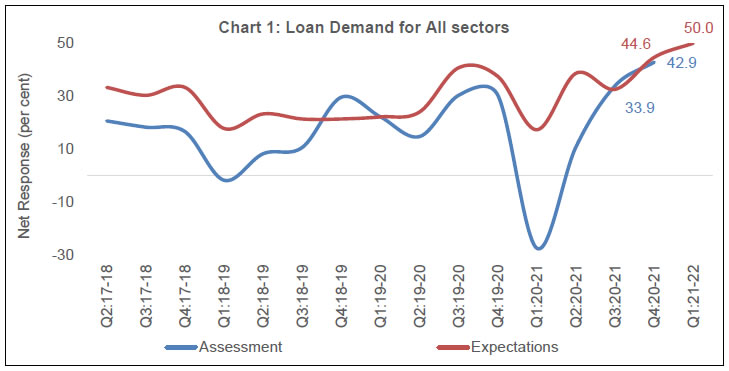 IST,
IST,
Bank Lending Survey for Q4:2020-21
Today, the Reserve Bank released results of 15th round of its quarterly Bank Lending Survey (BLS). This forward-looking survey is being conducted since Q2:2017-18 to capture the qualitative assessment and expectations of major scheduled commercial banks (SCBs) on credit parameters (viz., loan demand, terms and conditions of loans) for major economic sectors1. The latest round of the survey, conducted during Q4:2020-21, collected senior loan officers’ assessment of credit parameters for Q4:2020-21 and expectations for Q1:2021-222. Owing to uncertainty driven by the COVID-19 pandemic, an additional block was included in this round of the survey for assessing outlook for two quarters as well as three quarters ahead. Highlights: A. Assessment for Q4:2020-21
B. Expectations for Q1:2021-22
C. Expectations for Q2:2021-22 and Q3:2021-22

Note: Please see the excel file for time series data 1 The survey questionnaire is canvassed among major 30 SCBs accounting for more than 90 per cent of credit by SCBs in India. 2 The survey results reflect the respondents’ views, which are not necessarily shared by the Reserve Bank of India. Results of the previous survey round were released on the Bank’s website on February 5, 2021. 3 Net Response (NR) is computed as the difference of percentage of banks reporting increase/optimism and those reporting decrease/pessimism in respective parameter. The weights of +1.0, 0.5, 0, -0.5 and -1.0 are assigned for computing NR from aggregate per cent responses on 5-point scale i.e. substantial increase/ considerable easing, moderate increase/ somewhat easing, no change, moderate decrease/ somewhat tightening, substantial decrease/ considerable tightening for loan demand/loan terms and conditions parameters respectively. NR ranges between -100 to 100. Any value greater than zero indicates expansion/optimism and any value less than zero indicates contraction/pessimism. Increase in loan demand is considered optimism (Tables 1), while for loan terms and conditions, a positive value of net response indicates easy terms and conditions (Table 2). | ||||||||||||||||||||||||||||||||||||||||||||||||||||||
పేజీ చివరిగా అప్డేట్ చేయబడిన తేదీ:

















